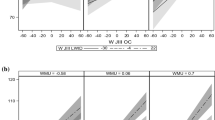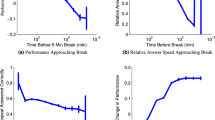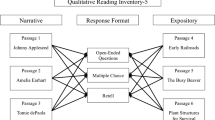Abstract
The individual and interactive effects of caffeine, time of day and history of caffeine consumption on several study-related tasks were investigated in 25 subjects (6 males, 19 females). Performance was measured on short term memory (STM), mental arithmetic (MA), reading comprehension, serial search (SS) and verbal reasoning (VR). Subjects attended eight experimental sessions, at four times of day (0100, 0700, 1300 and 1900 hours), after ingesting caffeine (4 mg/kg) or placebo. Subjects were assigned to a low, moderate or high user group on the basis of a caffeine consumption questionnaire. Reading comprehension was affected by time of day, while caffeine improved performance on all mental speed-related tasks. High caffeine users performed more poorly than other groups on the verbal reasoning task. Several interactions between the three independent variables were observed on a number of tasks, supporting the contention that different processes underlying various types of cognitive performance are differentially, and often jointly, affected by caffeine, time of day and user history. Implications of caffeine usage on academic performance were discussed.
Similar content being viewed by others
References
Blake MJF (1967) Time of day effects on performance in a range of tasks. Psychon Sci 9:349–350
Cattell RB (1930) The effects of alcohol and caffeine on intelligent and associative performance. Br J Med Psychol 10:20–33
Colquhoun P (1982) Biological rhythms and performance. In: Webb WB (ed) Biological rhythms, sleep and performance. John Wiley, Chichester, pp 59–86
Colton T, Gosselin RE, Smith RP (1968) The tolerance of coffee drinkers to caffeine. Clin Pharmacol Ther 9:31–39
Eysenck MW (1982) Endogenous determinants of arousal. In: Eysenck MW (ed) Attention and arousal. Springer, Berlin Heidelberg New York, pp 124–155
Folkhard S (1975) Diurnal variation in logical reasoning. Br J Psychol 66:1–8
Folkhard S, Monk TH (1983) Chronopsychology: circadian rhythms and human performance. In: Gale A, Edwards J (eds) Physiological correlates of human behavior. Academic Press, London
Foltz E, Ivy AC, Barborka CJ (1942) The use of double work periods in the study of fatigue and the influence of caffeine on recovery. Am J Physiol 136:79–86
Francis WN, Kucera H (1982) Frequency analysis of English usage: lexicon and grammar. Houghton Mifflin Company, Boston
Franks HM, Hagedorn H, Hensley VR, Hensley WJ, Starmer GA (1975) The effect of caffeine on human performance, alone and in combination with ethanol. Psychopharmacologia 45:177–181
Games PA, Howell JF (1976) Pairwise multiple comparison procedures with unequal n's and/or variances: a Monte Carlo study. J Ed Statist 1[2]:113–125
Games PA, Keselman HJ, Rogan JC (1981) Simultaneous pairwise multiple comparison procedures for means when sample sizes are unequal. Psychol Bull 90:594–598
Gilliland K, Andress D (1981) Ad lib caffeine consumption, symptoms of caffeinism, and academic performance. Am J Psychiatry 138:512–514
Gilliland AR, Nelson D (1939) The effects of coffee on certain mental and physiological functions. J Gen Psychol 21:339–348
Golding JF, Cornish AM (1987) Personality and life-style in medical students: psychopharmacological aspects. Psychology and health, vol 1. Harwood Academic Publishers, UK, pp 287–301
Goldstein A, Kaizer S, Warren R (1965a) Psychotropic effects of caffeine in man. II. Alertness, psychomotor coordination, and mood. J Pharmacol Exp Ther 150:146–151
Goldstein A. Warren R, Kaizer S (1965b) Psychotropic effects of caffeine in man. I. Individual differences in sensitivity to caffeine-induced wakefulness. J Pharmacol Exp Ther 149 [1]:156–159
Goldstein A, Kaizer S, Whitby O (1969) Psychotropic effects of caffeine in man. IV. Quantitative and qualitative differences associated with habituation to coffee. Clin Pharmacol Ther 10 [4]:489–497
Graham DM (1978) Caffeine—its identity, dietary sources, intake and biological effects. Nutr Rev 36 [4]:97–102
Griffiths RR, Woodson PP (1988) Caffeine physical dependence: a review of human and laboratory animal studies. Psychopharmacology 94:437–451
Ishihara K, Miyasita A, Inugami M, Fukuda K, Yamazaki K, Miyata Y (1985). Differences in the time or frequency of meals, alcohol and caffeine ingestion, and smoking found between “Morning” and “Evening” types. Psychol Rep 57:391–396
Julien RM (1981) A primer of drug action, 3rd edn. W.H. Freeman, San Francisco
Keselman HJ, Rogan JC (1978) A comparison of the modified-Tukey and Scheffe methods of multiple comparisons for pairwise contrasts. J Am Statist Assoc 73:47–52
Kirk RE (1968) Experimental design: procedures for the behavioural sciences. Brooks/Cole, California
Loke WH (1988) Effects of caffeine on mood and memory. Physiol Behav 44:367–372
Loke WH, Meliska CJ (1984) Effects of caffeine use and ingestion on a protracted visual vigilance task. Psychopharmacology 84:54–57
Loke WH, Hinrichs JV, Ghoneim MM (1985) Caffeine and diazepam: separate and combined effects on mood, memory, and psychomotor performance. Psychopharmacology 87:344–350
Monk TH, Leng VC (1982) Time of day effects in simple repetitive tasks: some possible mechanisms. Acta Psychol 51:207–221
Moore-Ede MC (1973) Circadian rhythms of drug effectiveness and toxicity. Clin Pharmacol Ther 14 [6]:925–935
Morrell PS (1964) Secondary Certificate English. Nelson, London
Nicholson AN, Pascoe PA, Stone BM (1989) The sleep-wakefulness continuum: interactions with drugs which increase wakefulness and enhance alertness. Alcohol Drugs and Driving 5 [4]:287–301
Patkai P (1971) Interindividual differences in diurnal variations in alertness, performance, and adrenaline excretion. Acta Physiol Scand 81:35–46
Rall TW (1980) Central nervous system stimulants: the xanthines. In: Goodman Gilman A, Goodman LS, Gilman A (eds) The pharmacological basis of therapeutics, 6th edn. Macmillan, New York, pp 592–607
Rapoport JL, Jensvold M, Elkins R, Buchsbaum MS, Weingartner H, Ludlow C, Zahn TP, Berg CJ, Neims AH (1981) Behavioral and cognitive effects of caffeine in boys and adult males. J Nerv Men Dis 169:726–732
Reinberg A, Smolensky MH (1983) Introduction to chronobiology. In: Reinberg A, Smolensky MH (eds) Biological rhythms and medicine. Springer, Berlin Heidelberg New York, pp 1–21
Revelle W, Humphreys MS, Simon L, Gilliland K (1980) The interactive effect of personality, time of day, and caffeine a test of the arousal model. J Exp Psychol 109 [1]:1–31
Saywer DA, Julia HL, Turin AC (1982) Caffeine and human behavior: arousal, anxiety, and performance effects. J Behav Med 5 [4]:415–439
Smith AP, Rusted JM, Savory M, Eaton-Williams P, Hall SR (1991) The effects of caffeine, impulsivity and time of day on performance, mood and cardiovascular function. J Psychopharmacol 5 [2]:120–128
Somani SM, Gupta P (1988) Caffeine: a new look at an age-old drug. Int J Clin Pharmacol Ther Toxicol 26 [II]:521–533
Weiss B, Laties VG (1962) Enhancement of human performance by caffeine and the amphetamines. Pharmacol Rev 14:1–36
Author information
Authors and Affiliations
Rights and permissions
About this article
Cite this article
Mitchell, P.J., Redman, J.R. Effects of caffeine, time of day and user history on study-related performance. Psychopharmacology 109, 121–126 (1992). https://doi.org/10.1007/BF02245489
Received:
Revised:
Issue Date:
DOI: https://doi.org/10.1007/BF02245489




